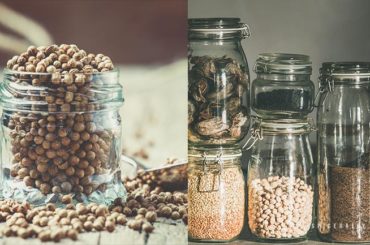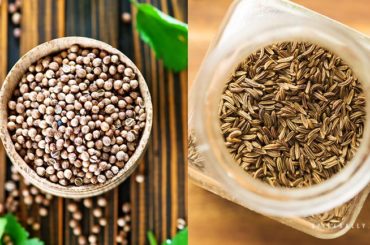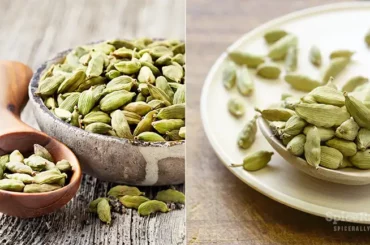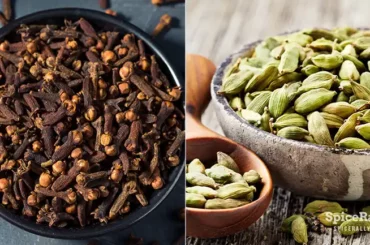Happiness does not always come in huge packages. Sometimes, it could be a small thing- maybe like a plate filled with your favorite food or a glass full of your favorite drink! And, we believe that most of you would want to and will include ginger with your favorite dish or beverage.
Ginger is indeed an enchanted spice with a distinctive flavor and aroma that could be utilized in cooking in multiple ways, such as fresh ginger chopped, grated, sliced, or crushed and dry ginger, powdered ginger, pickled ginger, preserved ginger, or candied ginger. These forms of ginger can be incorporated into many dishes, including curries, marinades, stir-fries, stews, beverages, and desserts.
This article will share a lot of information on this omnipresent spice and how it could be incorporated into our day-to-day meals with its remarkable health properties. So, let us see how ginger could rock your food and help you to live a strong, fit and healthy life.
How To Use Ginger In Cooking? (Unparalleled Goodness In A Rhizome)
Ginger is a culinary staple in many kitchens all over the world. It is the rhizome of the flowering plant Zingiber officinale, which is commonly used as a spice and folk medicine.

Ginger is a treasured flavoring in many of the world’s culinary practices. Accordingly, Chinese and Indian, and other many Asian cuisines are broadly inspired by ginger in curries, sauces, marinades, soups, stir-fries, and stews.
Fresh ginger is a prevalent marinade ingredient because it includes enzymes that help soften meat by breaking down its proteins.
When some marinade recipes use grated or minced ginger, others call for freshly pressed ginger juice. With the exception of marinades, ginger juice is also employed to impart savor to sauces. And as long as you’ve got fresh ginger in your pantry, it is child’s play to make your own juiced ginger!
Moreover, in Japan, ultra-thin cuts of pickled ginger are utilized as a complement to sushi. At the same time, in Western cooking, this flavorful spice is the spotlight in beverages like ginger tea, and ginger ale and sweet treats like gingerbread, candied ginger, and ginger snap cookies.
Ginger could be bought from the store in several forms. Consequently, the typical form it comes to us is as a root, and ginger root is obtainable fresh in most grocery stores.
Technically, ginger is not a root but a rhizome, which is the lumped belowground stem of the plant.
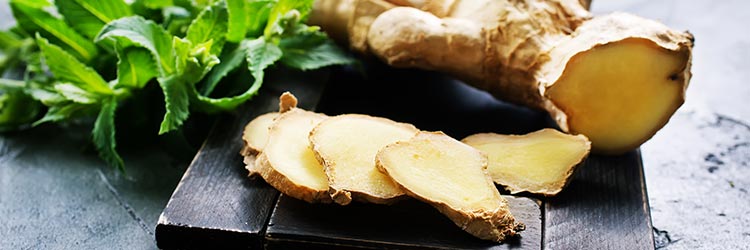
You will frequently find the mature rhizome, which has stringent skin that needs to be removed. But sometimes, you will get fresh immature ginger with delicate gauzy skin. This young ginger does not require peeling, and it has a milder flavor, while aged ones tend to be spicier and more coarse.
Moreover, ginger gets wrinkled when kept without using it for an extended period of time. So, we suggest that going for ones with smoother skinned rhizomes will always be a good choice to get the best benefits out of it.
You will also have the opportunity to buy ginger in powdered form. But, you will always have to have second thoughts in substituting it if your recipe calls for fresh ginger. Since it is much pungent and has a distinct flavor, replacing powdered ginger with fresh ginger in a place it calls for fresh ginger doesn’t really seem like a good idea.
However, the powdered version could work wonders with baking though. In fact, ginger powder is an excellent choice for preparing gingersnaps or gingerbread, particularly when you bake them in cold winter months or at Christmas, like December, to make it a real warm treat for the family!
Popular Varieties Of Culinary Ginger
While fresh ginger is the most employed variety in cooking, some other forms of this spice are also popular among its consumers. This section is dedicated to having a peek at them.
01- Ground Ginger
Ground ginger is just dried ginger ground to a fine powder. But, the pulverizing process gives it a distinct flavor and different effects. In flavor-wise, fresh ginger is sweeter and has a comprehensive, more intricate flavor than ground ginger.
02- Dried Ginger
The whole rhizome comes in its original shape. But of course, it is dehydrated and can be pulverized as required to season your food or refresh it. You can also buy dried ginger rhizome that is broken into pieces, which is excellent for making ginger tea.
03- Preserved Ginger
Preserved ginger is ginger that has been skinned, then cooked in, and preserved in sugar-salt-infused syrup.
The ginger is generally chopped and used in desserts. The sugar syrup usually has a great ginger kick and can be drizzled over fruits and ice cream.
04- Pickled Ginger (Gari)
This is often served and consumed after sushi and is occasionally called sushi ginger. And, it may also just be called pickled ginger. In Japanese cuisine, it is believed to be essential in sushi presentation. Some consider it is utilized to purify the palate between eating various pieces of sushi. Instead, it may be devoured prior to or after the meal.
Why Ginger Is Spicy?
Although ginger is described as spicy or fiery, on the contrary to popular belief, ginger is actually hot. It contains gingerol,shogaol,and zingiberene.
All three compounds derive from gingerol. Gingerol is a phenol discovered in fresh, raw ginger and is chemically connected to capsaicin, but it is much more temperate. Moreover, it is also associated with the eugenol found in nutmeg and cinnamon and the piperine from which black pepper gets its spicy bite.
Interestingly, when ginger is dried, the gingerol forms 6-shogaol, which is occasionally abbreviated to just “shogaol”. The conversion doubles the heat, and it is the reason why many people find dried ginger to be hotter than fresh ones.
Health Benefits Of Using Ginger
While ginger is an excellent spice to flavor foods, it plays a significant role by providing multiple outstanding health benefits. People who consume ginger as a culinary spice also use it as a folk medicine, especially in Asian countries.
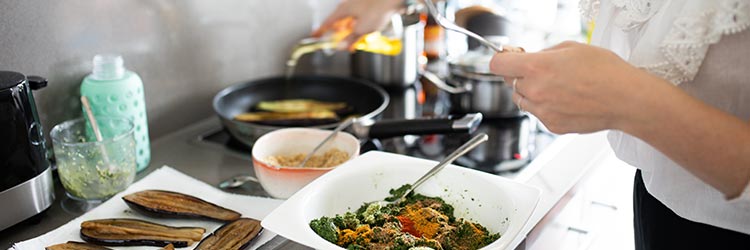
In fact, The oleoresin (oily resin) from the rhizomes of ginger contains many bioactive components, such as 6-gingerol, which is the pungent preliminary component that is acknowledged to wield a combination of great pharmacological and physiological moves.
According to the studies, ginger has been employed for thousands of years for the therapy of numerous ailments, such as nausea, colds, hypertension, arthritis, and migraines.
Accordingly, the draw in ginger or its diverse constituents as helpful prophylactic or healing agents has boosted noticeably over the past few years. And, scientific analyses concentrating on confirmation of ginger’s pharmacological and physiological actions have correspondingly improved.
Properties Of Ginger
| Vitamins | Minerals | Amino Acids |
| Vitamin B1 | Potassium | Arginine |
| Vitamin B2 | Calcium | Isoleucine |
| Vitamin B3 | Magnesium | Histidine |
| Choline | Sodium | Leucine |
| Vitamin B5 | Phosphorus | Lysine |
| Vitamin B6 | Iron | Tryptophan |
| Vitamin B9 | Manganese | Threonine |
| Vitamin C | Copper | Methionine |
| Vitamin E | Zinc | Phenylalanine |
As mentioned on top, ginger rhizome in raw fresh and dried form is utilized in both non-traditional and orthodox medicine, dietetics, cosmetology, and cooking.
On top of everything, the valuable properties of ginger include the following:
- Ginger enhances memory, and visual sensitivity soothes the body’s nervous system.
- Calibration of heart rate (One hundred grams of the fresh ginger root possesses at least 17% of the required daily dose of potassium)
- Ginger delivers vasodilation of the cardiac muscles.
- It strengthens the body’s defenses.
- It contains ascorbic acid, which produces particular antibodies to contagious diseases.
- Helps the digestive function.
- The functional elements of the ginger rhizome facilitate the production of the primary digestive enzymes accountable for the breakdown of carbohydrates, fats, and proteins.
- Frequent use of ginger supports accelerating the entire metabolism and getting freed of disproportionate gas building in the large intestine (flatulence).
- Efficacious therapy of diseases of the oral cavity and oropharynx.
- Fresh ginger rhizomes have marked anti-inflammatory, antiseptic, and advancing effects.
- It prevents atherosclerosis.
- The ginger rhizome holds a list of convertible and paramount amino acids, omega-3 and omega-6 fatty acids, that appreciatively impact the state of vascular walls and fat metabolism.
- Frequent-average consumption of ginger decreases the risk of conceiving atherosclerotic shifts in the lumen of blood vessels.
- Ginger efficiently alleviates the discomfort of nausea that takes place during pregnancy, as well as with various vestibular disorders (seasickness, motion sickness).
- It increases appetite- This effect is applicable for physical exhaustion (cachexia) when someone must restore average weight.
- Ease of skeletal muscles- The impact of muscle relaxation when employing ginger is accomplished by extending the blood vessels that provide the skeletal muscles.
- Ginger benefits muscle hypertonia, generated by osteochondrosis, extreme physical exercise, and hypothermia.
- Spasmolytic effect- To manage the headache caused by vascular spasms, it is sufficient to munch on a little slice of ginger.
- Normalizing the emotional condition – Ginger root effectively resists insomnia, panic attacks, depression, irritability, and phobias.
Ginger For Morning Sickness
Morning sickness is one of the most anticipated (lovely) battles that most women (about 80%) get to encounter during pregnancy. According to gynecologists, the signs are linked with a perfectly healthy baby in most cases, and they disappear by the fourth month. But some mothers have the symptoms for an extended period, even lasting their entire pregnancy. However, even though this symptom is known as “morning” sickness, it could come any time of the day during pregnancy.
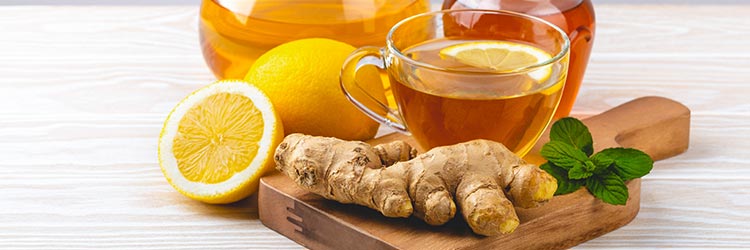
But, thankfully, apparently ginger comes to the rescue! The clinical studies show that ginger is effective for relieving vomiting and nausea caused during pregnancy. Mainly, two kinds of compounds in ginger- gingerols and shogaols are supposed to work on receptors in the digestive system and accelerate stomach emptying, which may promote relieving the feelings of nausea.
According to health experts, moms-to-be can have ginger as supplements. But, the ginger supplements should contain one hundred percent ginger without any additives. In addition, pregnant women can have ginger as a part of their diets, including ginger tea, candied ginger, ginger ale, or ginger snaps.
What Ginger Is Good For Morning Sickness?
As stated on top, ginger has shown effective results in alleviating the symptoms of morning sickness in pregnant women. But, what ginger is actually good for morning sickness?
Well, any ginger has the same chemical compounds. But, it is proved that gingerols and shogaols are high in fresh, raw ginger. Since the flavor of raw ginger could be a bit too intense for pregnant moms-to-be, they could try these methods to have ginger:
- Powdered ginger in capsules (should not be mixed with any other substance)
- Sliced fresh ginger steeped in hot water (Ginger tea)
- Preserved ginger (should be taken moderately due to the sugar content).
- Ginger candies (Lollipops, lozenges)
- Included in beverages (Ginger ale, ginger-infused black tea)
Ginger For Bloating
A bloated, gas-filled belly with infrequent burps can be a real pain on the neck. But, luckily, ginger, being a folk medicine since days of antiquity, seemingly comes to the rescue when we struggle with bloating.
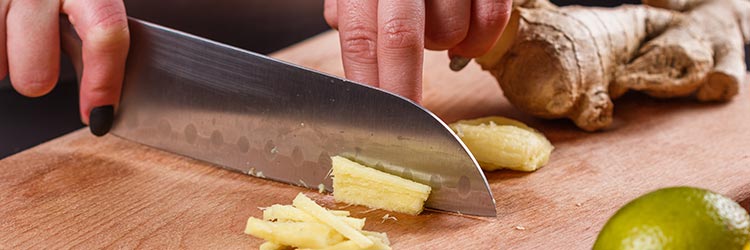
A review issued in 2018 shows that ginger has been employed as a food and herbal treatment in Asia and the Far East for many years back so that its placebo use has been well expressed in Chinese treatments from 400 BC. Since the good old days, ginger rhizomes have been utilized in miscellaneous time-honored medicine approaches.
Moreover, it has also been used as a home remedy in ministering myriad gastric conditions like:
- Bloating
- Constipation
- Diarrhea
- Dyspepsia
- Belching
- Gastritis
- Epigastric discomfort
- Gastric ulcerations
- Indigestion
- Nausea
- Vomiting
Can Ginger Help In Weight Loss?
Through our gentle escapade in explaining to you the precious health benefits of this fantastic spice, you may get a sudden question if ginger would help with beating those few extra pounds you carry with you. Well, if that’s what you worry about, we have the answers ready for you in this section as a piece of good news.
As you now know, ginger includes compounds called gingerols and shogaols which can provoke several physical movements in your body when you consume ginger.
Research exhibits that obesity can convey oxidative stress and inflammation and its antioxidant effects support controlling free radicals in our bodies.
However, although these properties of ginger do not straightly impact weight loss, they evidently counter cardiovascular impairment and other side effects of being overweight.
Other studies support the idea that ginger could play a part in weight reduction and revealed that overweight men who had ginger remained fuller for an extended time period.
Furthermore, gingerols stimulate specific biological actions in your body. They have an anti-obesity influence, allowing food to digest quickly and encouraging the body to flow digested food through the colon. Research also implies that gingerols may balance your blood sugar levels, and maintaining blood sugar steadiness can be vital to reducing weight.
Another systematic review that investigated the weight-loss advantages of ginger indicates that this spice has a powerful impact on body weight and belly fat (waist-to-hip ratio).
Benefits Of Ginger And Lemon- Are They A Good Pair Together?
Ginger and lemon, when you hear these two words together, you may already feel familiar. In fact, we are used to including lemon and ginger in hot water with a sweetener and enjoying it as a warm beverage.
Ginger and lemon drink has gained the popularity of many people all over the world as part of their morning rituals. It has soothing properties with the ability to detoxify and refresh the body.
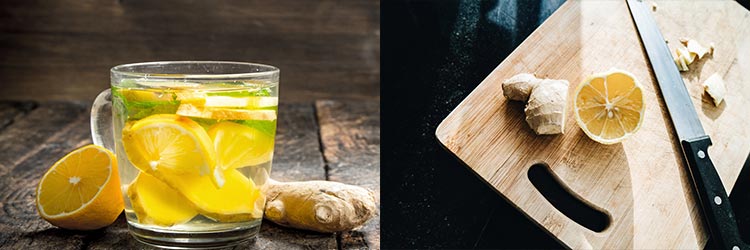
In addition to lemon and ginger, some even include turmeric and black pepper to intensify the immunity-boosting attributes. When lemon and ginger get together, they make a perfect source of Vitamin C so that it is beneficial in relieving the common cold and flu.
On top of everything, lemon and ginger work as a perfect duo to help with weight loss. Lemon has been demonstrated to lower insulin resistance, reducing the quantity of fat deposited in the body. And, ginger has been revealed to suppress hunger, supporting people to lose weight.
Why Ginger Tea Is Good?
Whatever the good things that we would get through ginger, the natural chemical compounds, gingerols, and shogaols, are emphasized as the reason. In fact, these chemical compounds have the ability to do wonders with the human body when consumed.
Consequently, ginger tea is a popular method to acquire the goodness of ginger in the body. People all around the world enjoy ginger tea for its super soothing properties. And, they make ginger tea in various methods by incorporating different effective ingredients that go with ginger, either using dry or fresh ginger.
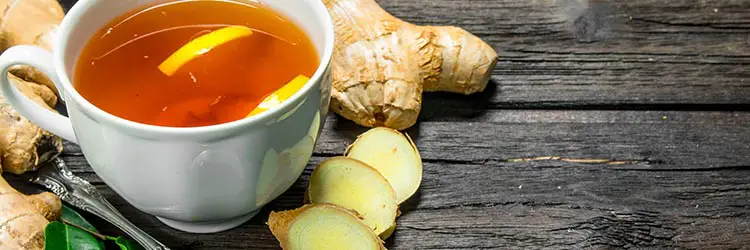
As an interesting matter of fact, primarily in Asian countries like India and Sri Lanka, the drink that they perceive as ginger tea is an infusion of black tea and ginger. Especially in Sri Lanka, they have a tradition of gathering as crowds whenever a funeral takes place. Usually, a majority of the crowd (basically close relatives) stay awake in the nights until the corpse has been buried or cremated. Therefore, on such nights, ginger-infused black tea is served to the gathering in order to help them stay awake.
The scientific reason behind this is that ginger’s excellent anti-oxidative and anti-inflammatory properties help the body fight against catching colds and provoking sinus infections that could possibly happen from sleep deprivation. Plus, ginger gives a kick to the brain receptors to keep a person awake for a longer period without feeling sleepy.
In addition to this, ginger tea is beneficial for the following reasons:
- Ginger tea prevents nausea and vomiting that can be a symptom of morning sickness and those who are undergoing chemotherapy.
- It could reduce bloating and cramping.
- Prevent indigestion and flatulence
- Soothes sore throat
- Helps with common cold and flu
- Alleviates nasal congestion
- It can act as a complementary medication option to help with nonalcoholic fatty liver
- The anti-inflammatory effects of ginger have potential effects of arthritis pain relief.
Ginger And Cognitive Function
The famous folk medicine ginger is a star when it comes to benefits the brain health, which is among the unknown advantages of this fantastic spice. Basically, the anti-oxidative properties are responsible for the edges we get on our cognitive function through ginger.

Let us now check out in what ways does ginger help with brain health.
- Ginger is abundant in antioxidants that shield the brain from free radical impairment.
- Ginger boosts the level of two of the most potent neurotransmitters, serotonin, and dopamine, ultimately leading to overcoming depression.
- It helps to treat dementia and memory loss.
- Ginger supplements show advancements in working memory, reaction time, and attention.
- Has potential benefits in Alzheimer’s disease.
- Ginger protects the brain from the neurotoxic effects of MSG included processed food.
In addition to these cognitive benefits, ginger functions as an antidepressant. It has proven results in helping with anxiety, mental stress, and other psychologically-related health issues which will affect the productivity of a person. Ginger root elixir and ginger tea are used to treat overactive minds, anxiety, and depression.
The Pungent Termination…
Ginger is indeed a miraculous culinary spice that has a LOT OF advantages! As you see, this is not merely a food flavoring that you include in your daily diet but also a therapeutic element that gives so many health benefits.
This article explained how a little slice from the rhizome of fresh and pungent ginger could go a long way when consumed. And its anti-oxidative, anti-inflammatory, immunomodulatory, analgesic, and antibacterial properties can treat a number of conditions like vomiting, nausea, weight loss, bloating, various kinds of pains, and benefits in cognitive function.
The natural compounds in ginger- gingerol and shogaols are essentially accountable for the charm of this spice. Coming to your hand in different forms such as fresh ginger, powdered ginger, dry ginger, pickled ginger, candied ginger, or preserved ginger- it is an excellent additive to any food that it calls for packed with nutrients.
So, we believe that our featured article shared a lot of important known and unknown facts on how to use ginger in cooking and its other uses. And now you might probably know why it is important to have this precious spice at home!

